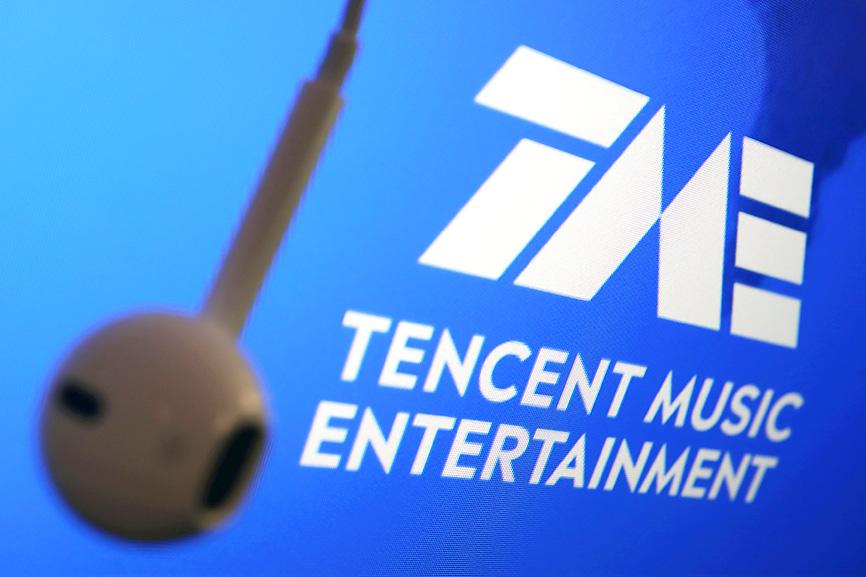China’s antitrust regulator is to order the music streaming arm of Tencent Holdings Ltd (騰訊) to give up exclusive rights to music labels, which it has used to compete with smaller rivals, two people with knowledge of the matter said yesterday.
The Chinese State Administration for Market Regulation (SAMR) would also fine it 500,000 yuan (US$77,222) for lapses in reporting the acquisitions of apps Kuwo (酷我) and Kugou (酷狗), the people said — a milder penalty than the forced sale indicated earlier this year.
SAMR, Tencent Holdings and Tencent Music Entertainment Group (騰訊音樂娛樂集團) did not respond to requests for comment.

Photo: Reuters
The move is the latest in a clampdown to curb the economic and social power of China’s once-loosely regulated Internet giants. The campaign, which began late last year, has included a record 18 billion yuan fine on e-commerce firm Alibaba Group Holding Ltd (阿里巴巴) for abusing its market position.
In April, it was reported that SAMR aimed to fine Tencent Holdings at least 10 billion yuan, while the social media leader was lobbying for leniency, and that regulator had told Tencent Music it might have to sell Kuwo and Kugou.
Instead, SAMR would no longer require a sale, but would impose the maximum 500,000 yuan fine for not properly flagging the 2016 app purchases for antitrust review, the people said.
“Personally, I think this punishment falls short and is even a boon for Tencent. The acquisitions obviously would restrict competition in the market, and should have been vetoed,” said You Yunting (游雲庭), a lawyer with Shanghai-based DeBund Law Offices (大邦律師事務所).
“It is too little a hit to Tencent Music’s dominant position in the market,” said You, a commentator on antitrust law.
Reuters could not determine whether Tencent Holdings faces any further antitrust penalty beyond the expected ruling on Tencent Music, China’s dominant music streamer.
On Saturday, SAMR said it would block Tencent Holdings’ plan to merge China’s two biggest video game streamers — Huya Inc (虎牙) and DouYu International Holdings Ltd (鬥魚) — on antitrust grounds, confirming an earlier Reuters report.
Tencent Music, China’s equivalent to Spotify Technology SA, had been pursuing exclusive streaming rights with labels including Universal Music Group, Sony Music Group and Warner Music Group Corp to fend off competition.
It became the subject of a SAMR investigation in 2018, which stopped the following year after the company agreed not to renew some of its exclusive rights, which normally expire after three years.
It nevertheless kept exclusive rights to music from some acts, including Taiwanese pop singer Jay Chou (周杰倫), who is one of the Chinese-speaking world’s most influential artists.
After SAMR’s latest ruling, Tencent Music would at least be able to retain rights to music from some domestic indie acts, a person with knowledge of the matter said.
Losing exclusive rights means Tencent Music would likely have to redouble efforts to build a more interactive and lively community to engage with its users. The firm has also been diversifying its content through long-form shows and live talk shows to attract more paying users as well as advertisers.
Tencent Music is facing a mounting challenge from ByteDance Ltd (字節跳動), which is using its Douyin (抖音) app — its Chinese version of TikTok — to promote music backed by sophisticated algorithms.

MAJOR BENEFICIARY: The company benefits from TSMC’s advanced packaging scarcity, given robust demand for Nvidia AI chips, analysts said ASE Technology Holding Co (ASE, 日月光投控), the world’s biggest chip packaging and testing service provider, yesterday said it is raising its equipment capital expenditure budget by 10 percent this year to expand leading-edge and advanced packing and testing capacity amid strong artificial intelligence (AI) and high-performance computing chip demand. This is on top of the 40 to 50 percent annual increase in its capital spending budget to more than the US$1.7 billion to announced in February. About half of the equipment capital expenditure would be spent on leading-edge and advanced packaging and testing technology, the company said. ASE is considered by analysts

TRANSFORMATION: Taiwan is now home to the largest Google hardware research and development center outside of the US, thanks to the nation’s economic policies President Tsai Ing-wen (蔡英文) yesterday attended an event marking the opening of Google’s second hardware research and development (R&D) office in Taiwan, which was held at New Taipei City’s Banciao District (板橋). This signals Taiwan’s transformation into the world’s largest Google hardware research and development center outside of the US, validating the nation’s economic policy in the past eight years, she said. The “five plus two” innovative industries policy, “six core strategic industries” initiative and infrastructure projects have grown the national industry and established resilient supply chains that withstood the COVID-19 pandemic, Tsai said. Taiwan has improved investment conditions of the domestic economy

Huawei Technologies Co’s (華為) latest smartphones carry a version of the advanced made-in-China processor it revealed last year, results from an independent analysis showed. This underscored the Chinese company’s ability to sustain production of the controversial chip. The Pura 70 series unveiled last week sports the Kirin 9010 processor, research firm TechInsights found during a teardown of the device. This is a newer version of the Kirin 9000s, made by Semiconductor Manufacturing International Corp (SMIC, 中芯) for the Mate 60 Pro, which had alarmed officials in Washington who thought a 7-nanometer chip was beyond China’s capabilities. Huawei has enjoyed a resurgence since

purpose: Tesla’s CEO sought to meet senior Chinese officials to discuss the rollout of its ‘full self-driving’ software in China and approval to transfer data they had collected Tesla Inc CEO Elon Musk arrived in Beijing yesterday on an unannounced visit, where he is expected to meet senior officials to discuss the rollout of "full self-driving" (FSD) software and permission to transfer data overseas, according to a person with knowledge of the matter. Chinese state media reported that he met Premier Li Qiang (李強) in Beijing, during which Li told Musk that Tesla's development in China could be regarded as a successful example of US-China economic and trade cooperation. Musk confirmed his meeting with the premier yesterday with a post on social media platform X. "Honored to meet with Premier Li